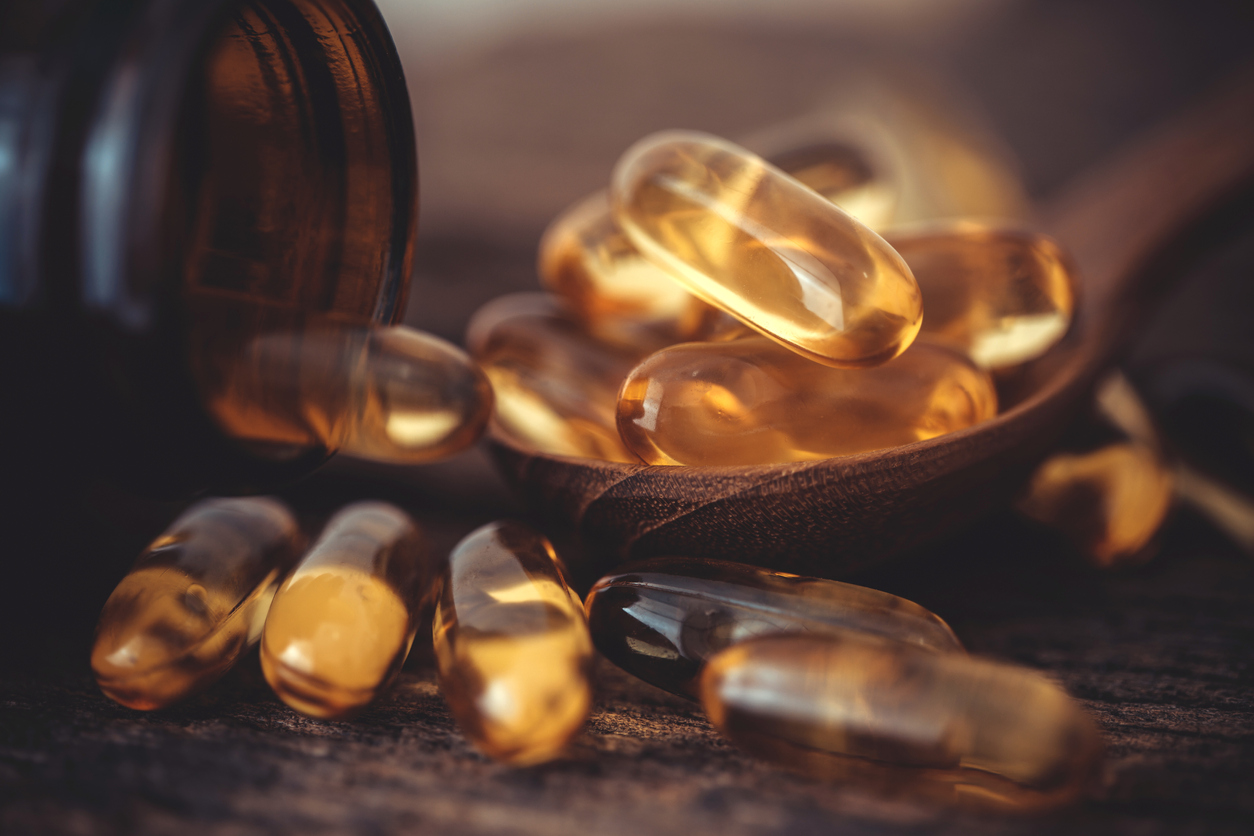Want to try fish oil supplements but no idea where to start? Dr Linia Patel is here to help.
Polyunsaturated fatty acids – what are they?1,2,3
Polyunsaturated fatty acids (PUFAs) are essential fats. This means you must get them from your diet as your body can’t make them. The term ‘polyunsaturated’ refers to the chemical structure. ‘Poly’ means ‘many’ and ‘unsaturated’ refers to double bonds. Multiple double bonds in PUFAs are crucial structure components in cell membranes. Each double bond causes a kink in the fat molecule, which produces a complex three-dimensional shape. These highly specific shapes run major signalling systems throughout the body. The signalling molecules are called prostaglandins and are involved in regulating various biological processes, such as the inflammatory response.
There are two major families of essential fatty acids: omega-3 and omega-6. Omega-3 refers to the position of the final double bond in the chemical structure, which is three carbon atoms from the ‘omega’ or tail end of the molecular chain.
- Omega (Ω)-3 fats. Those with most power in the body are called eicosapentaenoic acid (EPA) and docosahexaenoic acid (DHA). They are primarily found in oily fish. Smaller Ω3 fatty acids are found in plants, such as flaxseed and pumpkin seeds. Though somewhat beneficial, mammals are poor at utilising them to generate the more useful EPA and DHA. Omega-3s contribute to typical brain and eye development. They fight inflammation and may help prevent heart disease and a decline in brain function.
- Omega (Ω)-6 fats. Sources of Ω6 fatty acids include refined vegetable oils, such as sunflower, corn and rapeseed oil, nuts and seeds. Omega-6 fats are involved in signalling pathways and also provide energy for the body. In our normal modern diets, almost all of us consume more Ω6 than required.
Many people think of omega-9 fatty acids as essential. However, they aren’t, as the body can produce them. Omega-9 fatty acids are monounsaturated, meaning they only have one double bond. Replacing some saturated fats with omega-9 fats may be beneficial to your health. Omega-9 fats are common in vegetable and seed oils, nuts and seeds.
Recommended intake of essential fatty acids4,5
Recommendations for essential fats vary widely from country to country; however, most health organisations recommend an intake of at least 250-500mg of combined EPA and DHA per day. The World Health Organization recommends an increase in dosage to 1.1-1.6g of omega-3 fatty acids per day if you are pregnant, breastfeeding or at risk of heart disease.
To meet the recommended intake of essential fats in the diet, it is recommended that you eat two portions of fish per week, one of which should be oily – one portion of fish being 140g of fresh fish or one small can of fish. Oily fish includes mackerel, kippers, pilchards, sardines, trout, herring, salmon, crab (fresh) and whitebait.
If you are not a fish fan, then you may consider a fish oil supplement. Supplements are not recommended for the general public; however, if you are considering a supplement, you need to make sure you are taking the right one.
Which fish oils to choose?3,6,7,8,9
- Type of supplement. Omega-3 supplements come from many different sources and in many different forms. One key thing to consider is the amount of EPA or DHA a supplement contains, as these are the most important types of omega-3. Choose omega-3 rather than fish liver oil supplement, as liver oil comes with vitamin A which should be linked to no more than 1.5mg a day from supplements and food combined.
- Amount of omega-3. A supplement may say it contains 1,000mg of fish oil per capsule; however, on the back, you’ll read that EPA and DHA are only 200mg when combined. Read the label and choose a supplement that contains at least 500mg of EPA and DHA per 1,000mg of fish oil.
- Purity. Omega-3 fatty acids are prone to oxidation, which makes them go rancid. To avoid this, choose a supplement that contains an antioxidant.
- Freshness. Omega-3s are prone to going rancid. Antioxidants like vitamin E help with preservation. Once they go bad, they’ll have a foul smell and become less potent or even harmful. Always check the date and smell the product. Always keep your supplements away from light – ideally in the fridge. If your omega-3 supplement has a rancid smell or is out of date, don’t use it.
- Choose a fish oil supplement that has a sustainability certification, such as from the Marine Stewardship Council (MSC) or the Environmental Defence Fund. The production of fish oil from anchovies and similar small fish is more sustainable than that from large fish.
- Seek advice from a dietitian if in doubt!
Krill or fish oil?10
While fish oil is derived from fatty fish, krill oil is made from tiny crustaceans called Antarctic krill. Some studies have shown that krill oil may be better absorbed by the body. However, more studies are needed to confirm these findings. Krill oil also contains a powerful antioxidant called astaxanthin, which may protect it from oxidation and provide some additional heart health benefits. Fish oil is a reasonable choice if you are looking for good-quality omega-3 at a low price. On the other hand, if you are willing to spend extra money, you may want to consider krill.
Can you overdose?5
As with all things in nutrition, remember more is not better! According to the European Food Safety Association, omega-3 fatty acid supplements can be safely consumed at doses of up to 5,000mg per day. However, consuming too much could actually take a toll on your health and lead to side-effects such as high blood sugar and an increased risk of bleeding. So, it’s important to stick to the recommended dose and aim to get a lot of your intake from food sources or be working with a health professional.
You should now go check out Linia’s best-selling online educations:
- Nutrition for Menopause
- Gut Health – the power of the microbiome
- Low Carb: the evidence & application
Which one do you fancy?
AUTHOR BIO:

Dr Linia Patel has a BSc degree in biochemistry and physiology and has recently achieved a PhD in public health. Linia is a leading dietitian and sports nutritionist. Her passion is translating nutritional science into easy-to-digest and practical advice.
References
- Shahidi F et al (2018), Omega-3 polyunsaturated fatty acids and their health benefits, Annu Rev Food Sci Technol., 25(9): 345-81.
- Fard Ghasemi et al (2019), How does DHA fish oil effect health? A systematic review of evidence, Crit Rev Food Sci Nutr., 59(11): 1,684-1,727.
- Wei M et al (2011), Effects of eicosapentaenoic acid versus docosahexaenoic acid on serum lipids: a systematic review and meta-analysis, Curr Atheroscler Rep.
- Global recommendations of EPA and DHA: Microsoft Word – GlobalRecommendationsSummary19Nov2014Landscape (issfal.org) , accessed on 5 July 2022.
- EFSA and fish oil: EFSA provides advice on the safety and nutritional contribution of wild and farmed fish | EFSA (europa.eu) , accessed on 5 July 2022.
- Ritter et al (2015), Oxidation rates of triacylglycerol and ethyl fish oils, Journal of the American Oil Chemist Society, 92: 561-69.
- Reid et al (2015), Comparison of bioavailability of krill oil versus fish oil and health effect, Journal of the American Oil Chemist’s Society, 92: 561-69.
- Brenna et al (2002), Efficiency of conversion of alpha-linolenic acid to long chain n-3 fatty acids in man, Curr Opin Clin Nutr Metab Care, 5(2): 127-32.
- Raygan et al (2019), Comparison between the effects of flaxseed oil and fish oil supplementation on cardiovascular health in type 2 diabetic patients with coronary heart disease: A randomised double-blinded, placebo-controlled trial, Phytothe Res., 33(7): 1,943-51.
- Hyunsin et al (2020), Krill oil has different effects on the plasma lipidome compared with fish oil following 30 days of supplementation in healthy women: A randomised controlled and crossover study, Nutrients, 13, 12(9): 2,804.







